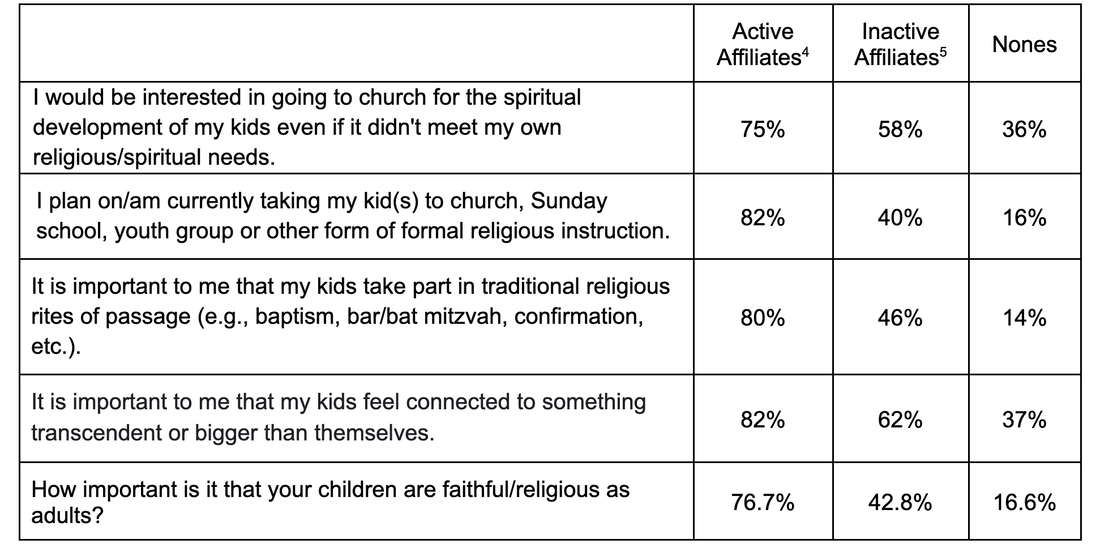Major Finding 1: The faith stops here (or Nones are parenting VERY differently)
We asked a number of questions about how parents are providing or planning to provide for the spiritual and religious development of their children. The divide between those affiliated with traditional religious systems (Buddhism, Christianity, Hinduism, Judaism, Islam, Sikhism) and those with no religious affiliation, the “Nones,” is significant. Across the board, a story emerges where the Nones are pretty clearly rejecting institutional forms of faith and planning on engaging them little if at all in the course of their parenting.
In every case, the Nones are nearly the exact opposite of their traditionally religious counterparts. They are statistically significantly less likely to take their kids to church, formal religious instruction, encourage them to participate in a faith tradition or engage in religious rites of passage. Nones are also significantly less concerned about their children losing faith, developing a sense of spirituality or becoming religious at all.
In every case, the Nones are nearly the exact opposite of their traditionally religious counterparts. They are statistically significantly less likely to take their kids to church, formal religious instruction, encourage them to participate in a faith tradition or engage in religious rites of passage. Nones are also significantly less concerned about their children losing faith, developing a sense of spirituality or becoming religious at all.
Chart 1: I would be interested in going to church for the spiritual development of my kids even if it didn't meet my own religious/spiritual needs.

Chart 2: It is necessary to believe in God in order to be moral and have good values.
In other words, Nones as parents present a significant challenge to the church. They are simply not concerned about formal, institutional religious and spiritual formation of their children. Even when compared with inactive affiliates (those who claim a religious affiliation but do not attend), they stand out.
Inactive affiliates are open to the idea of returning to regular religious life even if just for their children with over half agreeing that they are in fact planning on it and strongly support their children engaging in some kind of religious or spiritual life.
It is worth noting that at some level more regular attendance seems to be turning people OFF of the idea of raising their kids in the faith. Table 2 below shows that the rate of discouragement doubles among people who have an affiliation and attend regularly. In fact, they are nearly three times as likely to discourage their kids from participating in a faith tradition than Nones are. This suggests that attendance on Sunday mornings might not be the silver bullet to re-engaging Young Adult Parents.
Inactive affiliates are open to the idea of returning to regular religious life even if just for their children with over half agreeing that they are in fact planning on it and strongly support their children engaging in some kind of religious or spiritual life.
It is worth noting that at some level more regular attendance seems to be turning people OFF of the idea of raising their kids in the faith. Table 2 below shows that the rate of discouragement doubles among people who have an affiliation and attend regularly. In fact, they are nearly three times as likely to discourage their kids from participating in a faith tradition than Nones are. This suggests that attendance on Sunday mornings might not be the silver bullet to re-engaging Young Adult Parents.
Table 1: Percent “Agree” and “Strongly Agree” or “Extremely Important” and “Very Important”
Table 2: If one of your children decided they wanted to participate in a faith tradition (ie., Christianity, Evangelical, Judaism, Islam, etc.) which would best describe your response:
If Nones are not interested in passing on the faith through formal avenues, perhaps they are planning on less formal mechanisms for imparting religious or spiritual knowledge. In this area, we find much more of a mixed bag. 53% of Nones said they plan to let their religious/spiritual beliefs inform their parenting “Very little” or “Not at all” compared to 24% of Inactive Affiliates and just 5% of Active Affiliates. Along those same lines, only 5% of Nones say they trust religious texts/leaders for parenting advice, compared to 21% of Inactive Affiliates and 53% of Active Affiliates,
Additionally, over half of Nones (52.3%) say it’s “Not at all important” for their kids to be faithful/religious as adults compared to just 14.8% of Inactive Affiliates and 2% of Active Affiliates, indicating that they are not planning to place much of an emphasis in this area during their parenting.
However, as we saw above, over ⅓ of Nones still desire a connection to the transcendent for their kids and 29% of Nones agreed that when things are hard their faith/belief in God sustains them and gets them through. Additionally, over 60% of Nones say they are spiritual and/or religious in some way and about 45% express trust for local congregations and religious people.
(4) People who claim a religious affiliation and attend services once per month or more.
(5) People who claim a religious affiliation and attend services “seldom” or “never.”
Additionally, over half of Nones (52.3%) say it’s “Not at all important” for their kids to be faithful/religious as adults compared to just 14.8% of Inactive Affiliates and 2% of Active Affiliates, indicating that they are not planning to place much of an emphasis in this area during their parenting.
However, as we saw above, over ⅓ of Nones still desire a connection to the transcendent for their kids and 29% of Nones agreed that when things are hard their faith/belief in God sustains them and gets them through. Additionally, over 60% of Nones say they are spiritual and/or religious in some way and about 45% express trust for local congregations and religious people.
(4) People who claim a religious affiliation and attend services once per month or more.
(5) People who claim a religious affiliation and attend services “seldom” or “never.”





